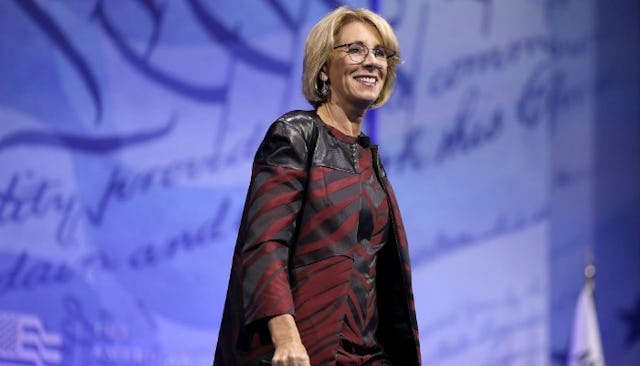You're Wrong Betsy DeVos. Schools Are Not Businesses.

According to Betsy DeVos, our country’s new secretary of education and a billionaire conservative heiress, choosing a school for your child is just like deciding between Uber, Lyft, or a taxi.
DeVos has long been a champion for “school choice” (using tax dollars that would go to local public schools to pay for vouchers so that students can attend private or religious schools) and has donated large amounts of her own family’s fortune to school choice efforts.
In her speech to the Brookings Institution on Wednesday, DeVos said:
“[H]ow many of you got here today using an Uber, a Lyft, or another ridesharing service? A few of you, good. Did you choose that because it was more convenient than hoping a taxi would drive by? Even if you didn’t use a ridesharing service today, I would bet most of you at least have the app on your phone. Just like the traditional taxi system revolted against ridesharing, so, too, does the education establishment feel threatened by the rise of school choice. In both cases, the entrenched status quo has resisted models that empower individuals. Nobody mandates that you take an Uber or a Lyft over a taxi, nor should they. But if you think ridesharing is the best option for you, the government shouldn’t get in your way.”
DeVos was immediately slammed on Twitter for the breathtaking privilege of that statement.
Aside from the entitlement embedded in her remarks, equally troubling is that DeVos revealed a dangerous belief that schools should be run like, and treated like, businesses. What DeVos doesn’t seem to understand is that education is a public right in this country. It is provided to our citizens as a public good, meant to benefit individuals as well as society as a whole.
In the field of education, many of us (I was a teacher for over a decade before returning to grad school to get a doctorate in education policy) consider this view — that schools should operate like private businesses — as part of a disturbing trend toward undermining public schools. DeVos continues to display a shocking lack of respect for public education and its role in a democracy and in communities.
Here’s why DeVos’s comparison between selecting a ride-sharing service and choosing a school is just wrong and harmful to schools, teachers, and most importantly, to kids as well:
Choosing a school is nothing like choosing a driving service, or a restaurant, or a cell phone company because the stakes are SO MUCH HIGHER.
If you make a bad choice with your selection of a taxi company, the worst-case scenario is that you have a bad, expensive car ride. If you choose a bad school for your kid, you won’t find out in an hour, or a day, or a month. We need to work to make sure that all public schools are excellent. We need standards and accountability for all schools, including private and religious schools that receive taxpayer money through the sorts of voucher programs that DeVos advocates for. (DeVos has previously resisted the same level of accountability for these other types of institutions.)
Teachers aren’t anything like car service drivers.
DeVos has shown a deep lack of respect for teachers before in her comments. In this instance, according to DeVos’s analogy, teachers could be seen as similar to Uber drivers: low-paid, interchangeable semi-professionals. In reality, teachers are highly trained and educated, with advanced degrees.
Education is NOT about profit and competition.
As a public good, it should work for all children. In the business world, when companies compete and some bad businesses go under because of poor service, this is good for consumers. But if school vouchers take kids out of the public school system, there will always be kids left in those “failing” schools, and they are most likely to be the poorest and most disadvantaged.
As the moderator of the event, a senior fellow at the Brookings Institution, said, criticizing DeVos’ statement: “In other words, in a market where public schools are at the mercy of local property taxes to maintain funding, unregulated competition can leave the poorest families with no choices at all.”
Education IS about personal relationships and actual human beings.
The purpose of a business is to make profit for its owners. The mission of schools is to serve the community and to create productive, creative, and successful young people. Day in and day out, schools and educators must confront the messy, wonderful, complex, and emotional reality of children’s lives, most of which can’t be measured or quantified by test scores. Teachers teach students about how to think, how to see the world, how to be a kind person.
There’s little evidence that DeVos-style school choice programs even work.
In DeVos’s own state of Michigan, where there are many voucher programs, a large Michigan State study found that kids enrolled in these programs do no worse or no better than students in public schools.
Parents must resist these efforts to experiment with our kids’ future. Kids shouldn’t have to “shop” for a good education. We know what works: excellent and respected teachers, well-funded schools, and a society that values public education not as a business but as critical to democracy itself.